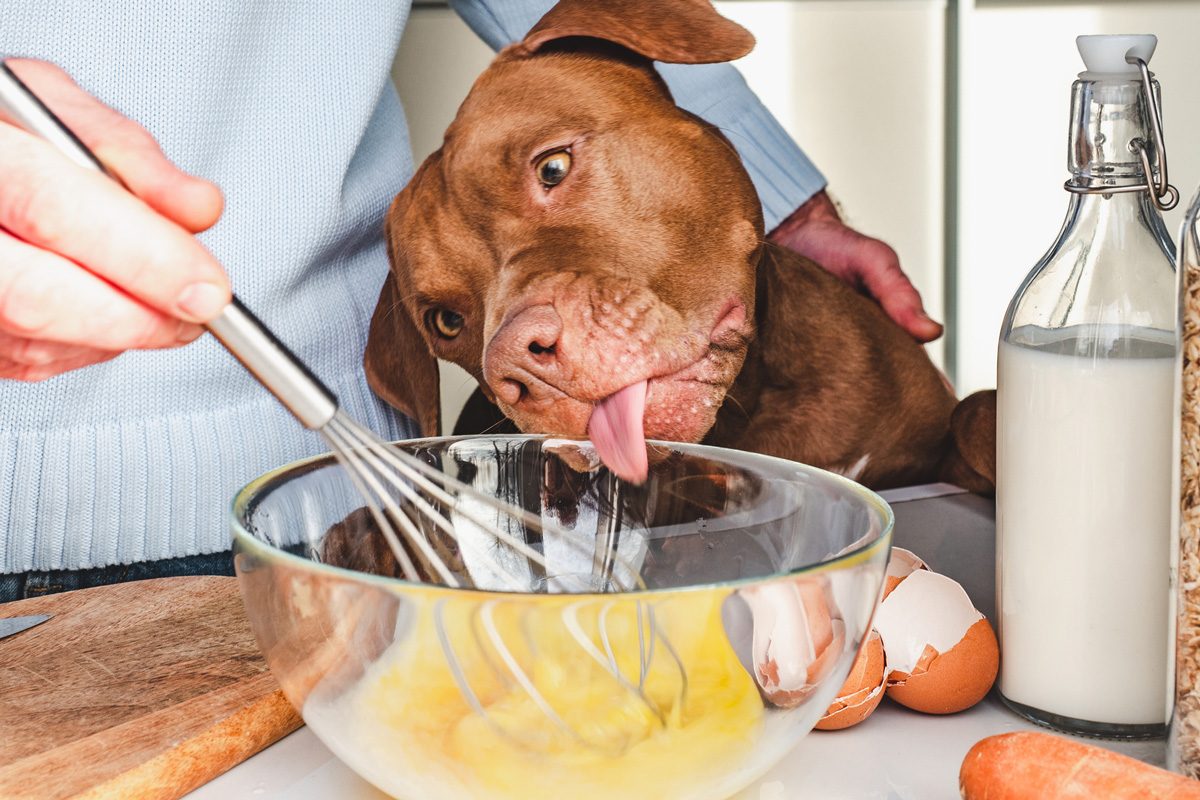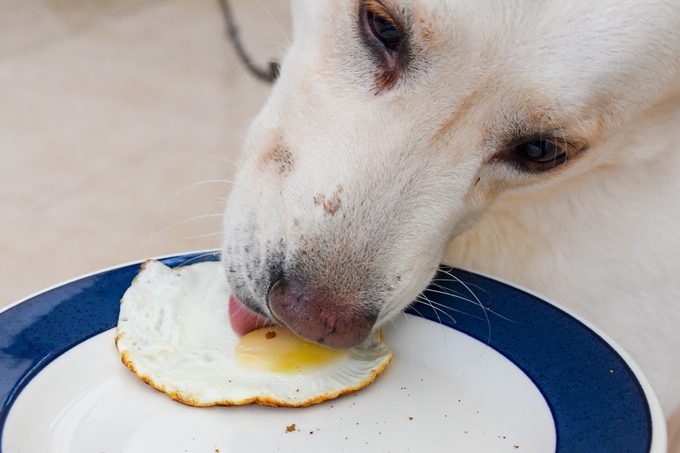Can dogs eat eggs? Well, of course they can. The real question is: Should they?

Can Dogs Eat Eggs? Here’s What Vets Say

Your fork is poised above the heaping pile of scrambled eggs you whipped up for yourself. But just as you’re about to dig in, you notice that your dog is staring at you with those sweet, soulful eyes and begging for a bite. It’s almost too much to resist—but you can’t remember if eggs are one of the human foods that are safe for dogs. So can dogs eat eggs? And if so, does it matter how they’re prepared and how many you fork over?
So many questions! To answer them and keep your dog both healthy and happy, we spoke with four veterinarians about the ideal diet for dogs. Read on for all the answers you need before breakfast tomorrow, so you know what’s OK to give your pup—and what isn’t.
Get Reader’s Digest’s Read Up newsletter for more pets, humor, cleaning, travel, tech and fun facts all week long.
Are eggs good for dogs?
Yes, eggs are indeed good for dogs! Not only can they help settle a pooch’s upset tummy, but they are also a superb source of vitamins and nutrients essential to your dog’s overall health, according to veterinary surgeon Kathryn Rosalie Dench, DVM. These include:
Protein
Protein helps supply your pup with energy, aids in the growth and maintenance of muscle mass, builds and repairs tissues, and supports healthy immune function, according to Ellen Russell, DVM, a veterinarian in Richmond, Virginia. And it just so happens that eggs are one of “the best protein sources you can offer your canine companion,” adds Sabrina Kong, DVM, a veterinarian with We Love Doodles.
Vitamins
Eggs contain several vitamins that support your dog’s health. “Vitamin A is important for healthy vision and growth, B2 helps convert food into energy, B12 helps with the formation of red blood cells and supports a healthy nervous system, and D helps your dog absorb calcium for strong bones,” Dr. Russell explains.
Minerals
“Eggs are also a good source of minerals, such as iron, phosphorus, selenium and zinc,” adds Dr. Russell. Iron is important for healthy blood. Phosphorous supports strong bones and teeth. Selenium helps maintain a healthy immune system. And zinc is essential to your dog’s skin and coat.
Essential fatty acids
In addition to protein, vitamins and minerals, eggs are also rich in essential fatty acids. Two in particular, omega-3 and omega-6, are important for maintaining the health of your pup’s skin and coat. Omega-3s are heart-healthy and may even help your four-legged friend live longer.
Can dogs eat eggs every day?

Since eggs are packed with essential doggy nutrients, you might be wondering if it’s one of those daily dog-owner must-dos or if you can just make breakfast for two every morning and streamline your routine a bit. The answer is no, according to Dr. Kong. Consider eggs an occasional treat, not a regular canine breakfast.
The high protein content in eggs can cause problems for some dogs, particularly ones with certain preexisting conditions, including kidney disease. In addition, eggs have a high cholesterol content. While that’s not an issue for most healthy dogs, it may present challenges for pups with pancreatitis, Dr. Dench points out.
Eggs may also contribute to canine weight gain, so think moderation. Exactly how many eggs can a dog eat per week? It depends on your pooch’s size, weight and activity level, as well as their overall health. Be sure to check with your vet before incorporating eggs into your pet’s diet. In the meantime, use these guidelines from Maria Baker, DVM, a veterinarian with Pet-How, as a starting point:
- Medium-size dogs and larger: 1 egg per day
- Small to medium-size dogs: 1/2 egg per day
- Toy-size dogs: 1/4 egg per day
In case you were wondering: Yes, puppies can eat eggs too. Follow the same guidelines noted above. And for both puppies and adult dogs, introduce eggs slowly and be on the lookout for any issues, including gastrointestinal upset. If your dog isn’t tolerating the egg well for whatever reason, stop giving it to them and talk to your vet.
What’s the best way to prepare eggs for your dog?
Generally speaking, dogs can have eggs in just about any form … with a few caveats. For starters, make sure to cook them thoroughly—runny eggs pose food safety risks for dogs, as they do for humans. Second, don’t add ingredients that are toxic to dogs, such as garlic, mushrooms and onions, or even things like cheese and salt, since that can quickly turn the dish from healthy to unhealthy for them.
So while you should steer clear of omelets, can dogs eat scrambled eggs? What about baked eggs? Here are the dishes that vets give their stamp of approval:
Boiled eggs
Boiled eggs are the “best way to serve eggs to your pup,” according to Dr. Baker. Not only does boiling ensure an egg has been cooked fully, but this method also “makes the egg easier for your pup to digest,” she says. Just be sure to remove the entire shell before giving a boiled egg to your pooch.
Scrambled eggs
Good news: Scrambled eggs are perfectly healthy for dogs. In fact, after boiled, this is the next-safest cooking method, Dr. Baker says. Just make sure to cook the scrambled eggs thoroughly. And skip the milk, butter, salt and spices, all of which can irritate your dog’s stomach.
Baked eggs
“Baked eggs are also a good choice, as they provide a crunchy texture that many dogs enjoy,” Dr. Baker says. To bake an egg for your dog, preheat your oven to 325 degrees Fahrenheit, crack an egg into an oven-safe ramekin and leave it to bake for 10 to 12 minutes.
Is it safe for dogs to have raw eggs?
No. Dogs shouldn’t eat eggs raw because there is a risk of bacterial contamination. Raw eggs may harbor foodborne bacteria, including salmonella and E. coli. In dogs, just as in humans, “these bacteria can cause digestive upset and lead to illness,” Dr. Dench says.
If you think your dog has slurped up raw eggs, you’ll want to keep an eye out over the next several days for signs of intestinal distress, such as diarrhea, vomiting and loss of appetite. Dr. Russell notes these may also be symptoms of an egg allergy or sensitivity. Need another reason to avoid giving your pup raw eggs? Some research suggests consumption of raw eggs may contribute to biotin deficiency in dogs. Signs of this deficiency include loss of appetite, hair loss and flaky skin.
Can dogs eat eggshells?
Although dogs can eat eggshells, your four-legged pal shouldn’t be going to town on them. While eggshells are primarily composed of calcium carbonate—which can help meet your dog’s calcium needs—too much calcium can actually be harmful to dogs, Dr. Dench explains. Plus, some dogs have difficulty swallowing and/or digesting eggshells, unless they’ve first been pulverized into a fine powder. To play it safe, check in with your vet to see whether they recommend eggshells for your particular pup.
About the experts
|
Why trust us
At Reader’s Digest, we’re committed to producing high-quality content by writers with expertise and experience in their field in consultation with relevant, qualified experts. We rely on reputable primary sources, including government and professional organizations and academic institutions as well as our writers’ personal experiences where appropriate. We verify all facts and data, back them with credible sourcing and revisit them over time to ensure they remain accurate and up to date. Read more about our team, our contributors and our editorial policies.
Sources:
- Kathryn Rosalie Dench, DVM, veterinary surgeon and veterinarian adviser for Gentle Dog Trainers
- Ellen Russell, DVM, small-animal veterinarian in Richmond, Virginia, and vet consultant with The Malamute Mom
- Sabrina Kong, DVM, small-animal veterinarian in northern California, veterinarian with We Love Doodles and certified canine rehabilitation practitioner
- Maria Baker, DVM, veterinarian at Pet-How with more than 10 years of experience providing veterinary care to small animals
- Hill’s Pet: “Can Dogs Eat Eggs?”
- Clinical Nutrition Service at Tufts University’s Cummings School of Veterinary Medicine: “My pet has kidney disease—what kind of diet should I feed?”
- American Kennel Club: “People Foods Dogs Can and Can’t Eat”





















